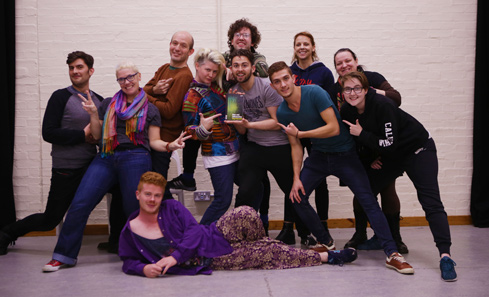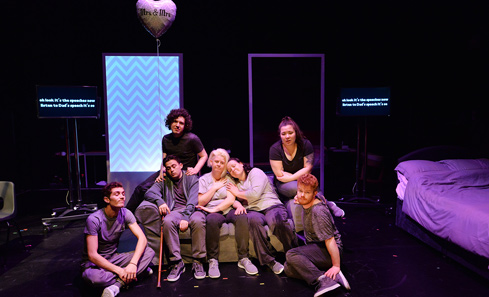A group of Royal Conservatoire students have taken a unique stage adaptation on tour, playfully exploring different ways of making work for both D/deaf and hearing audiences.
The students, undertaking BA Performance in British Sign Language (BSL) and English at the Royal Conservatoire of Scotland, collaborated with Solar Bear to produce a stage version of Caryl Churchill’s Love and Information, embarking on their first professional tour in November 2017. Most scenes are in BSL, some in English, some a mix of both, along with on-stage captioning. We spoke to the team to find out more.

Jessica Brettle (Production Designer): Love and Information is a play with a series of 50 scenes split into seven sections with no set characters or settings or situations. It is a text of conversations that you can have in everyday life which everyone can relate to in some way. The characters and settings are for the cast and director to decide upon. The characters chosen and the settings can change the way the text comes across. Therefore showing us that information and how we relay it can change the way it is perceived.
Jonathan Lloyd (Director): The play is about how we try to make sense of the world around us. All of the decisions are left to the director and actors to make so it was exciting and daunting to work on!
EJ Raymond (Actress): I would describe Love and Information as based on real life, out there in the real world. It doesn’t matter who those people are, their colour of skin, their disability, their culture, etc. Anyone at any given time could be going through similar versions of the stories.
Jessica: Visually the challenge was how to create a space that could accommodate all the scenes and characters without distracting from what was being said. Also to be able to move from one scene to another in a very short amount of time without the scene changes becoming the dominant factor. The play is in separate sections which enabled us to change and set up for the different scenes at the start of each section and then move things to a minimum to create the separate scenes.
Jonathan: I loved it but it was hard work. The production was in two languages: BSL and English. The cast had to work incredibly hard to translate the dialogue. The creative team had to create captions for every scene, so that deaf and hearing audiences could understand what was happening. The editing and cue-ing of these captions, and working out where to place the captioning screens took a lot of time and effort. We learnt a huge amount.
Many deaf members of the audience remarked how refreshing it was to see a show where the dominant language was BSL.- Jonathon Lloyd, Director, Solar Bear
EJ: I helped the director to be aware of how to ensure accessibility with the captioning, such as putting in sound effects (like knocking) and using different colours so the audience can identify the character speaking. We didn’t want the BSL language to be formal, more like the way we would do so in a conversation. It was so difficult to make everything perfect! But hopefully the play showed the audience a reflection of real life.
Jessica: We realised that the minimal amount of changes to the costume worked much better so each actor was given a basic neutral costume that with a slight add-on or sometimes adding nothing worked best. As the production was being done with BSL it was also important to make sure the costume didn't interfere with the visual communication by having too much pattern and certain colours. These were discussed with the cast.

EJ: My favourite scene is “Mother”, a big sister confesses to her wee sister that she is actually her mother. There was a very powerful bond between the sisters and it could’ve turned out a lot worst than they expected. I also liked “A Child Who Didn’t Know Fear”, a storytelling scene and I’m a storyteller in my career.
Jonathan: For all of us at Solar Bear (the theatre company I run), one of the most satisfying parts of the experience was seeing young actors who had started off many years ago with our Deaf Youth Theatre embark on their first professional tour of Scotland. We’re dedicated to developing the next generation of talented deaf actors and supporting them to work far and wide. We think that next year, when these students graduate, will be an exciting time for the UK theatre industry.
Jessica: I personally found it fascinating to watch and work out what was happening in a scene through the actors’ use of BSL and how they performed it. I think the production was very accessible to everyone because of this. Though I’m unsure of how it would come across if audio described. Something to think about?
Jonathan: Very positive. Many deaf members of the audience remarked how refreshing it was to see a show where the dominant language was BSL, and that this production was a great showcase for the expressive and theatrical possibilities of BSL. The hearing audiences had to work hard to follow the captions but on the whole felt that the production showed them a glimpse of a new kind of storytelling, which we hope will be more and more visible over the next few years.
EJ: The audience seemed to have enjoyed the play, positive feedback and overwhelming. Good overwhelming!
The Royal Conservatoire of Scotland's BA Performance in British Sign Language and English undergraduate degree teaches students to be both actors and makers of work, exploring the most innovative ways of creating performance through BSL and English. The course is designed around the learning and teaching needs of deaf performers and is the only course of its kind in Europe. The programme has been developed in association with Solar Bear Theatre Company with input from a range of theatre, education and deaf professionals.